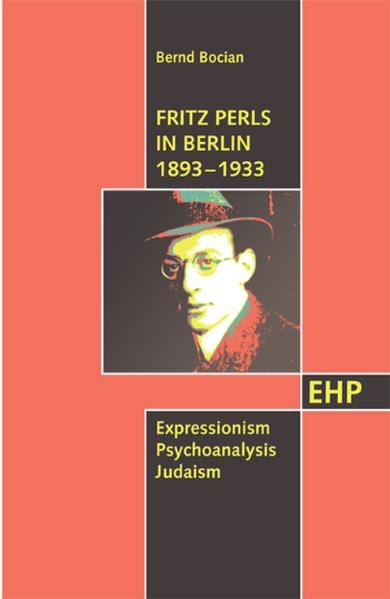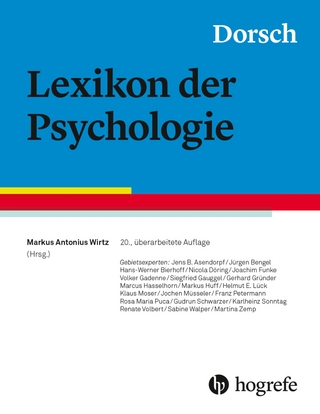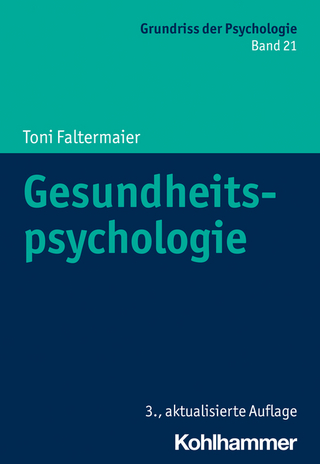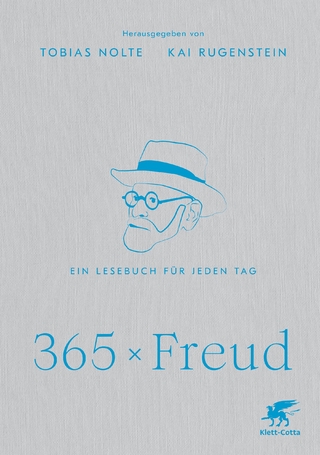
Fritz Perls in Berlin 1893–1933
EHP Edition Humanistische Psychologie (Verlag)
978-3-89797-068-7 (ISBN)
Deutsche Vereinigung für Gestalttherapie: Greeting 11
European Association for Gestalt Therapy: Greeting 13
Preface to the English edition 15
Preface and Acknowledgements (from the fi rst German edition) 17
TOPICALITY AND THE WORK OF REMEMBERING 21
I. BIOGRAPHICAL COMPONENTS 29
1. Formative Life Contexts. War – Expressionism – Psychoanalysis 29
2. The Jewish Context and the Educational Ideal of Classical Humanism 32
2.1 Jews in the German Empire. Between Antisemitism and German-Jewish Cultural Chauvinism 33
2.2 Bourgeois Humanism Turns into Nationalism 37
2.3 The Humanistic Educational Ideal. Individuality and Holistic Personality Development 41
2.3.1 Friedrich Schiller. The 'Middle Mode' and 'Living Gestalt' 42
3. Early Infl uences 43
3.1 A Family from the Eastern Reaches of the German Empire 43
3.2 The Perls Family. 'Creeping up the Middle-Class Ladder' 46
3.3 Childhood. Father Confl ict and Rebellion 48
3.3.1 'The Emperor has no Clothes.' 52
3.4 Experiences in School. The Subservient Mentality and Unsuccessful Triangulation 53
3.4.1 The Winners in Modernization. Concerning the Level of Jewish Education 53
3.4.2 Cruel Teachers and an Absent Father 57
3.5 Perls’s Father. An Irregular Free Mason 61
3.5.1 'The Order of Humanists' and the Peculiarity of Life in Nathan Perls’s Lodges 62
3.5.2 Grand Master Nathan Perls. Revisionist and Nonconformist 65
3.6 Experiences in the Theater. The Search for Emotional Truth 66
3.6.1 A Mother Who Loved Art 67
3.6.2 Max Reinhardt 67
3.6.3 Perls the Actor. Revealing False Poses 70
3.7 Sexuality. Freud and Kohut 73
3.7.1 Sexual Need and Hunger for Life 73
3.7.2 Perls’s 'Sexual Problem' and Self Psychology 75
3.8 Medical Studies 78
4. War, Trauma, and Revolution 80
4.1 War and the Cultural Avant-Garde 82
4.2 Working for the Red Cross and the Initial Shock of War 85
4.3 The Front Line, Gas Warfare, Death. Field Theory as an Experience 87
4.4 The 'Jewish Census' and the German-Jewish Patriots 91
4.5 Bohemian Berlin. Injury and Opposition 94
4.6 The Trauma of War 96
4.7 Revolution and Murder Continue 100
4.7.1 The Civil War of 1918/1919 in Berlin 102
4.7.2 Rosa Luxemburg and Karl Liebknecht are Murdered. The Bohemian Scene Radicalizes Itself 104
4.8 Perls in 'Peaceful Freiburg' and the Counter-Revolution in Munich 106
4.9 Gustav Landauer’s Liberal Socialism 109
5. The Artistic Avant-Garde in Berlin and the Expressionist Weltanschauung 112
5.1 Perls in the Bohemian Circle Surrounding Salomo Friedlaender/Mynona 115
5.2 Ego Dissociation and the Renewal of Humanity 118
5.3 Hannah Höch. The Simultaneity of Perception. Constructivism 121
5.4 A Precious Figure against a Nihilistic Ground 122
5.5 Friedlaender/Mynona’s Approach. Nietzsche, Polarism, the Middle Point 123
5.6 The Dadaistic Revolt and the Gestalt Dada 128
5.6.1 Fritz Perls – 'Gestalt Dada' 131
5.7 Raoul Hausmann. „Philosopher of Dada' and Polarity Theoretician 134
5.8 Otto Gross. Anarchism and Psychoanalysis 136
5.8.1 Gross and Hausmann. Revolting against One’s Own Conventions 138
5.8.2 Cultural-Revolutionary Psychoanalysis. One’s Own Authority as Opposed to the Authority of the Other 140
5.8.3 The Need for Contact. Loneliness or Submission 142
6. The Years of the Weimar Republic 145
6.1 The Early Crisis Years. Anti-Semitism and Infl ation 145
6.2 The 'Golden Twenties.' Americanism and the Coldness Metaphor 148
6.3 Psychoanalysis. Initial Contacts 153
6.3.1 Sigmund Freud as the Saviour 153
6.3.2 Karen Horney. Human Involvement and Hopes of Growth 157
6.4 Frankfurt. The Gestalt Concept or, Thinking in Terms of Context and Relationships 160
6.4.1 Goldstein, Lewin and the Unconscious 161
6.4.2 An Integrative Atmosphere 164
6.4.3 Psychoanalysis and Gestalt Psychology 166
6.5 Intermezzo at the Vienna Psychoanalytic Institute 169
6.5.1 Attending Wilhelm Reich’s 'Technical Seminar.' Resistance and Character Analysis 173
6.5.2 Orgasm and the Genital Character 178
6.6 A New Beginning in Berlin. Medicine and Psychoanalysis 180
6.6.1 Working as a Physician 180
6. 6.2 Learning and Suff ering at the Psychoanalytic Institute 182
6.7 The Bauhaus Concept 186
6.8 Political Polarization, Dialectics, and Alienation 189
6.8.1 Perls Attempts to Take a Class Position 191
6.8.2 Georg Lukács. Hegel, Dialectics and the Contextual Method 194
7. The Concept of Totality 198
7.1 Totality on the Left and on the Right 198
7.2 The Transitional Gestalt and the Figure of Tension 199
7.3 The Individualism of Lebensphilosophie 201
8. At the Berlin Psychoanalytic Institute. 1930–1933 204
8.1 Siegfried Bernfeld. The Gestalt Experience and 'Social Place' 206
8.2 Wilhelm Reich. Politics and the Continuing Development of Active Technique 208
8.2.1 Neocatharsis and Physical Resistance. From Ferenczi to Fenichel and Reich 210
8.2.2 Masochism and Politics. Bernfeld and Freud against Reich 213
9. Hunger, Chewing, Growing. Intellectual Approaches of One’s Own in Opposition to the Power of Psychoanalytic Interpretation and the German Tradition of Obedience 215
9.1 Ernst Bloch. The Hunger Drive, Self-Extension, and the Dawning of the New 217
10. Trauma Therapy and Figures of Steel 220
10.1 The Trauma of War and 'Acting Out' Therapy 221
10.2 Armored Men. Men of Steel 225
11. Perls’s Lessons from the End of the Weimar Republic 229
11.1 Dr. Perls and the 'Marxist Workers’ School' (MASCH) 230
11.2 Left Freudians 231
11.3 Splitting instead of Integration. The Failure of the 'Anti-Fascist Action' 235
11.4 The Marginalization of Wilhelm Reich 237
11.5 Endangerment and Escape 240
11.5.1 Confl uence and Projections Can Cost Lives 244
12. Exodus and Death 246
12.1 The Fate of the Perls Family in Berlin 248
II. THE EXPERIENCES OF THE GERMAN-JEWISH AVANT-GARDE. THEIR TOPICALITY TODAY 249
1. German-Jewish Experiences 249
1.1 Kafka’s Four-Legged Beings 250
1.2 Universalism, Loneliness, Modernity 251
1.3 Gestalt Assimilation Theory. A Biological-Sociological Resistance Metaphor 253
2. Autonomy instead of Auschwitz: Confl uence Kills 255
3. Perls’s Topicality: Identity Work 259
3.1 Nietzsche and the Artists 260
3.2 The Multiplicity of the Subject 262
3.3 Kafka and Perls. 'But' versus 'And' 263
4. Mephistopheles As a Ferment for Integration. Perls’s Leitmotiv 264
4.1 There Is No End to Integration 264
4.2 Mephistopheles. Disturbing and Complementing 266
5. Conclusion. Expressionists, Émigrés, and Those in Search of a Homeland 267
Annotations 269
APPENDIX 295
Institutions and archives consulted 295
References 295
Index 312
'Immensely exciting to read and a marvelous example of writing the history of psychotherapy without losing sight of social conditions.'
(Tom Levold, Systemmagazin.de)
'A groundbreaking work on the biography of Fritz Perls and the wellsprings of Gestalt therapy. The author addresses highly topical questions about the potential for individual development and its limitations under the conditions prevailing in a fragmented and fragmenting society.'
(Olaf-Axel Burow, University of Kassel)
'This book is an important and interesting contribution to the history of the psychoanalytic movement and the definition of gestalt therapy. In his gestalt approach, the dissident psychoanalyst Perls embodied, integrated, and saved from oblivion the rich life experiences of the Berlin avant-garde culture in which Jews played such an important role. an excellent read.'
(Zvi Lothane, Mount Sinai School of Medicine / New York University, International Forum for Psychoanalysis)
| Erscheint lt. Verlag | 9.9.2010 |
|---|---|
| Reihe/Serie | EHP - Edition Humanistische Psychologie |
| Übersetzer | Philip Schmitz |
| Sprache | englisch |
| Original-Titel | Fritz Perls in Berlin 1893–1933. Expressionismus - Psychoanalyse - Judentum |
| Maße | 150 x 210 mm |
| Gewicht | 320 g |
| Einbandart | Paperback |
| Themenwelt | Geisteswissenschaften ► Psychologie ► Allgemeines / Lexika |
| Schlagworte | Berlin • Biografie • Biography • Gestalttherapie • Gestalt therapy • Perls, Fritz • Perls, Lore • Psychoanalyse • Psychoanalysis • Psychoanalytiker • Psychoanalytis • Psychologe • Psychotherapeut • Psychotherapie • Psychotherapist • psychotherapy • Weimarer Republik • Weimar Republic |
| ISBN-10 | 3-89797-068-6 / 3897970686 |
| ISBN-13 | 978-3-89797-068-7 / 9783897970687 |
| Zustand | Neuware |
| Haben Sie eine Frage zum Produkt? |
aus dem Bereich


